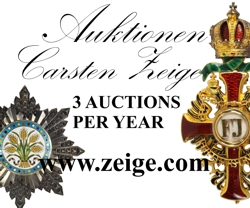RAD Post-1943 Duty Station Badge
CATEGORY: Version
SKU: 80.GOR.03.02.05.01.005.000
Estimated market value:
Estimated market value:
The RAD (Reichsarbeitsdienst = Reich Labour Service) was officially established on June 26, 1935 as the sole, and compulsory, labour service of Germany. Its purposes were to help the economy, curb unemployment, and indoctrinate its members with the NSDAP ideology, as well as play its part in militarising the German population.
The FAD (Freiwilliger Arbeitsdienst = Voluntary Labour Service) was the precursor of the RAD in the early 1930s. Official uniform regulations were first introduced on October 1, 1933, with modifications made in July 1934. It is also known as NSAD (Nationalsozialistischer Arbeitsdienst = National Socialist Labour Service).
The earliest uniforms were a not entirely successful attempt at standardisation. They gave way to a second wave ... of FAD uniforms that, when the RAD was established, experienced no significant changes.
The Duty Station Badge was introduced on August 18, 1933. It was worn by all personnel, positioned on the upper left sleeve of the service tunic. The insignia is in the form of a shield which was initially black, but after April 29, 1941 this was changed to earth-brown. The shield features a spade with a small handle, gold-coloured for General ranks, silver-coloured for Officer ranks, and white for EM/NCO ranks.
The badge for Honorary Leaders (Ehrenführer) was distinguished by a white outer border, the one for retired Officers by a red one. This was introduced on November 23, 1934.
The duty position was indicated by letters and/or numerals. They were in red, except for General ranks who had black ones. General ranks were only found in the Reichsleitung and Arbeitsgauleitung. A blank spade without letters or numbers was used by members of the Reichsleitung. Arbeitsgaue were identified by Roman numerals, Arbeitsgruppen by Arabic numerals, Abteilungen by two rows of Arabic numerals.
On November 5, 1943 a regulation stated that new badges would no longer carry numbers, but left blank, and complemented with a brown rectangular shield with a white unit number, to be worn above the badge.
Letters were always in Roman script, with the exception of the “W” badges, which featured Gothic script. In the case of multiple letters, they are often divided by a small diamond-shaped hyphen. Some badges feature a combination of letters and numbers in two lines, the numbers being positioned underneath the letters.
The following letters were used:
B: Bezirksleitung (male staff of RADwJ districts)
BS: Bezirksschule (district school)
BSF: Bezirksschule Führung (district school leadership)
FS: Feldmeisterschule (training school for Junior Officers)
LA: Lehrabteilung (training detachment)
LAR: Lehrabteilung Reichsschule (training detachment at the national school)
LV: Lehr- und Versuchslager (training and research camp)
M: Meldeamt (communication office)
RS: Reichsschule (national training school)
RST: Reichsschule für Arbeitstechnik (national school for labour technology)
TS: Truppführerschule (training school for Senior NCOs)
W: Westwall (Siegfried line)
Show more

Comments
Sign in to comment and reply.


Scroll Top